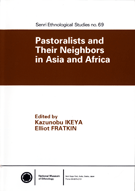Senri Ethnological Studies (SES)
 No.69 Pastoralists and Their Neighbors in Asia and Africa
No.69 Pastoralists and Their Neighbors in Asia and Africa
2005年8月23日刊行
Edited by Kazunobu Ikeya and Elliot Fratkin
バックナンバー
刊行の目的および意義
2002年9月22日から27日にかけて『国際人類学・民族学中間会議』(Inter-Congress of the International Union of Anthropological and Ethnological Sciences)が東京で開催された。本書は、そこでのセッション(「牧畜民と他の集団との社会経済関係」)における研究報告がもとになっている。執筆者は、アメリカ、フランス、ドイツ、インド、日本の5ヵ国からなり、ロシア(以下民族名、チュクチ)、モンゴル(ツァータン、モンゴル)などの北アジア、ネパール(グルン)、インド(ライカ)などの南アジア、スーダン(ベジャ、ラシャイダ)、ケニア(トゥルカナ)などの東アフリカの牧畜民を対象にしている。
近年の牧畜民に関わる文化人類学的研究では、国家体制のなかでの彼らと他集団との関係、および商品経済化の影響を受けている経済関係に焦点をおき、牧畜民の社会経済変容を把握することがみられる。本書では、牧畜民の社会変容は、畜産物にかかわる経済関係、家畜飼育の委託をめぐる社会関係、NGOや国家に関わる政治関係の3つの関係と同時に、植民地時代や旧社会主義時代にかかわる歴史的把握が不可欠であることを明らかにしている。牧畜民は、他集団との関係を維持しながら、新たな商品経済の浸透や内戦によって生れた難民キャンプに対して独自の対応をしてきたのである。本書には、国家と民族との関係、民族間関係、社会変容などに関心のある研究者に対しても参考になる点が多く含まれている。
近年の牧畜民に関わる文化人類学的研究では、国家体制のなかでの彼らと他集団との関係、および商品経済化の影響を受けている経済関係に焦点をおき、牧畜民の社会経済変容を把握することがみられる。本書では、牧畜民の社会変容は、畜産物にかかわる経済関係、家畜飼育の委託をめぐる社会関係、NGOや国家に関わる政治関係の3つの関係と同時に、植民地時代や旧社会主義時代にかかわる歴史的把握が不可欠であることを明らかにしている。牧畜民は、他集団との関係を維持しながら、新たな商品経済の浸透や内戦によって生れた難民キャンプに対して独自の対応をしてきたのである。本書には、国家と民族との関係、民族間関係、社会変容などに関心のある研究者に対しても参考になる点が多く含まれている。
Contents
Preface
Kazunobu Ikeya and Elliot Fratkin
1. Introduction:
Pastoralists and Their Neighbors: Perspectives from Asia and Africa
Pastoralists and Their Neighbors: Perspectives from Asia and Africa
Kazunobu Ikeya and Elliot Fratkin
2. A Comparative Approach to Transition and Social Change among Livestock Pastoralists in East Africa and Central Asia
Elliot Fratkin
3. Socioeconomic Relationships between Herders and Hunters:
A Comparison of the Kalahari Desert and Northeastern Siberia
A Comparison of the Kalahari Desert and Northeastern Siberia
Kazunobu Ikeya
4. Maintaining Cohesion through Rituals:
Chukchi Herders and Hunters, a People of the Siberian Arctic
Chukchi Herders and Hunters, a People of the Siberian Arctic
Virginie Vaté
5. Mobile Livestock-Keeping in Mongolia:
Present Problems, Spatial Organization, Interactions between Mobile and Sedentary Population Groups and Perspectives for Pastral Development
Present Problems, Spatial Organization, Interactions between Mobile and Sedentary Population Groups and Perspectives for Pastral Development
Jörg Janzen
6. North and South Mongolia:
A Comparison of Two Mongolian Pastoralist Societies
A Comparison of Two Mongolian Pastoralist Societies
Takahiro Ozaki
7. The Transformation of the Community of Tsaatan Reindeer Herders in Mongolia and Their Relationships with the Outside World
Tetsuya Inamura
8. Trading Process of Livestock Products:
The Case of Mobile Sheep Herders in Eastern Nepal
The Case of Mobile Sheep Herders in Eastern Nepal
Kazuyuki Watanabe
9. Livestock Economy and Camel Pastoralism among the Raika in India
Kazunobu Ikeya
10. Historical Socil-economic Relationships between the Rashayda and the Beja in the Eastern Sudan:
The Production of Racing Camels and Trade Networks across the Red Sea
The Production of Racing Camels and Trade Networks across the Red Sea
Hiroshi Nawata
11. Environmentalism, Development and the Crisis of pastoral Legitimacy:
Rajasthan's Nomadic Pastoralists and the Forests of Madhya Pradesh
Rajasthan's Nomadic Pastoralists and the Forests of Madhya Pradesh
Purnendu Kavoori
12. Coexisting with Cultural “Others” :
Social Relationships between the Turkana and the Refugees at Kakuma, Northwest Kenya
Social Relationships between the Turkana and the Refugees at Kakuma, Northwest Kenya
Itaru Ohta
List of Contributors
For enquiries about the series and to obtain copies of this volume, please contact:
Publications Office
National Museum of Ethnology
Senri Expo Park, Suita City, Osaka, 565-8511 JAPAN
Fax: +81-6-6878-7503
email: hensyu@idc.minpaku.ac.jp
Publications Office
National Museum of Ethnology
Senri Expo Park, Suita City, Osaka, 565-8511 JAPAN
Fax: +81-6-6878-7503
email: hensyu@idc.minpaku.ac.jp
